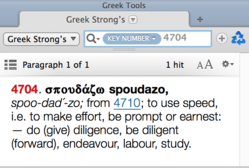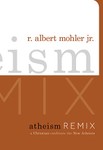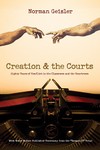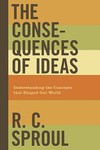Years ago, I can remember my teachers quoting 2 Timothy 2:15 in the classic King James Version: “Study to shew thyself approved unto God, a workman that needeth not to be ashamed, rightly dividing the word of truth.” Their emphasis was on the word study, but they were actually misinterpreting the meaning of the word.
The New Oxford American Dictionary on my computer offers three different definitions for study. When most of us use this word today, we think of the first use listed: “devote time and attention to acquiring knowledge on (an academic subject), especially by means of books: she studied biology and botany.” Certainly, this is what my teachers meant, but this meaning is not what the word study means in 2 Timothy 2:15 as rendered by the King James Version.

And it just so happens that if you’re the kind of person who wants to “make an effort” to gain a better foundation in apologetics or theology, this week’s new titles are for you. Six new titles are now available allowing you to “study to shew thyself approved.”
|
|
Atheism Remix: A Christian Confronts the New Atheists Dawkins, Dennett, Harris, and Hitchens—these are the “new atheists.” Atheism has always been with us, but it has taken on a new flavor in recent years. In this volume, Al Mohler examines the thought of the new atheists and equips Christians to effectively interact with those who follow them. |
|
|
Creation and the Courts: Eighty Years of Conflict in the Classroom and the Courtroom Renowned apologist Norman L. Geisler traces the history of creation vs. evolution battles in the courts since the famous Scopes Trial of 1925. Examining a total of six significant trials in the last eight decades, Geisler not only makes observations about the declining state of Christian influence in education and civil discussion, he also helps the believer understand which issues are truly worth fighting for in this debate. |
|
|
Nothing But the Truth: Upholding the Gospel in a Doubting Age 1 Peter 3:15 states, “but sanctify Christ as Lord in your hearts, always being ready to make a defense to everyone who asks you to give an account for the hope that is in you, yet with gentleness and reverence” (NASB). In Nothing but the Truth, John MacArthur examines what it means to put this verse into regular practice. To equip the believer to interact with a secular culture, John MacArthur focuses on four specific elements of evangelism in today’s world: your attitude, your preparedness, the content of your answers, and your priority in witnessing. |
|
|
The Consequences of Ideas: Understand the Concepts that Shaped Our World Used by many as an introductory text for philosophy courses, R. C. Sproul takes the reader on a historical journey in The Consequences of Ideas from classical Greek philosophy to the influence of Darwin and Freud in our world today. Whether we realize it or not, the ideas of Plato, Augustine, Locke, Hume, and many others still influence us in significant ways in the modern world. Sproul suggests that ideas are never neutral; but rather, they always have impact and consequences. |
|
|
Liberating Black Theology: The Bible and the Black Experience in America Many considered Liberation Theology to be an increasingly forgotten school of thought until the teachings of President Obama’s former pastor, Rev. Jeremiah Wright, brought them back into discussion at a national level during the presidential campaign of 2008. In Liberating Black Theology, Anthony B. Bradley (professor of theology at the King’s College in New York City) addresses the often controversial and sensitive issues of the black experience in America and its continued influence from Liberation Theology. From the publisher: “…Liberating Black Theology does more than consider the ramifications of this belief system; it suggests an alternate experience that can truly liberate all Christ-followers.” |
|
|
Experiencing the Truth: Bringing the Reformation to the African American Church Centered around the themes of theology, preaching, worship, spirituality, and the doctrines of grace, Anthony J. Carter, Ken Jones, and Michael Leach communicate the importance of Reformed Christianity to the African American Church. In an attempt to counter the all-too-common practice of choosing a church based on felt needs, this book is an attempt to refocus this very important choice of community and fellowship upon finding a church where biblical truth and sound Christian doctrine is proclaimed. |







